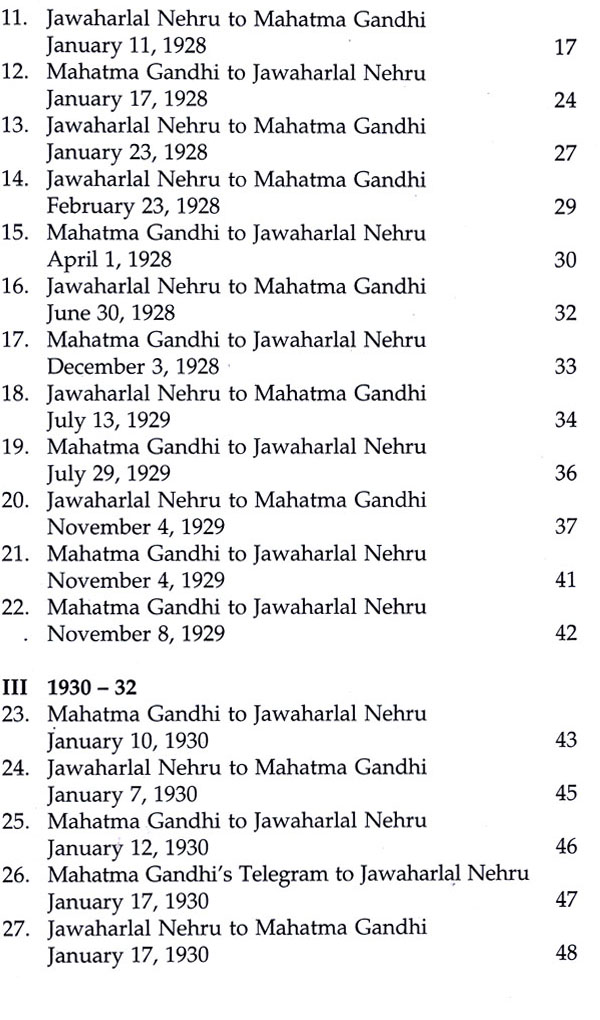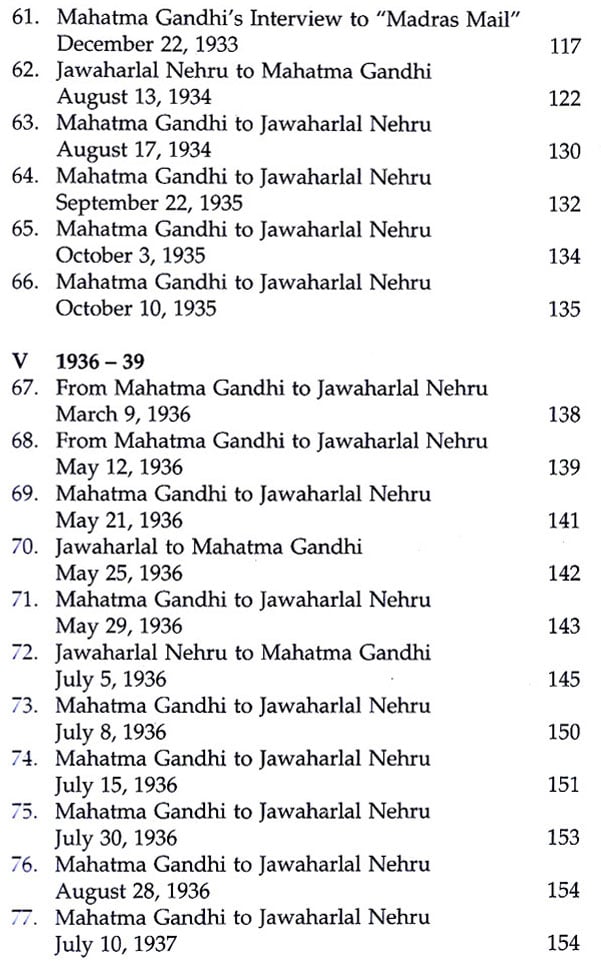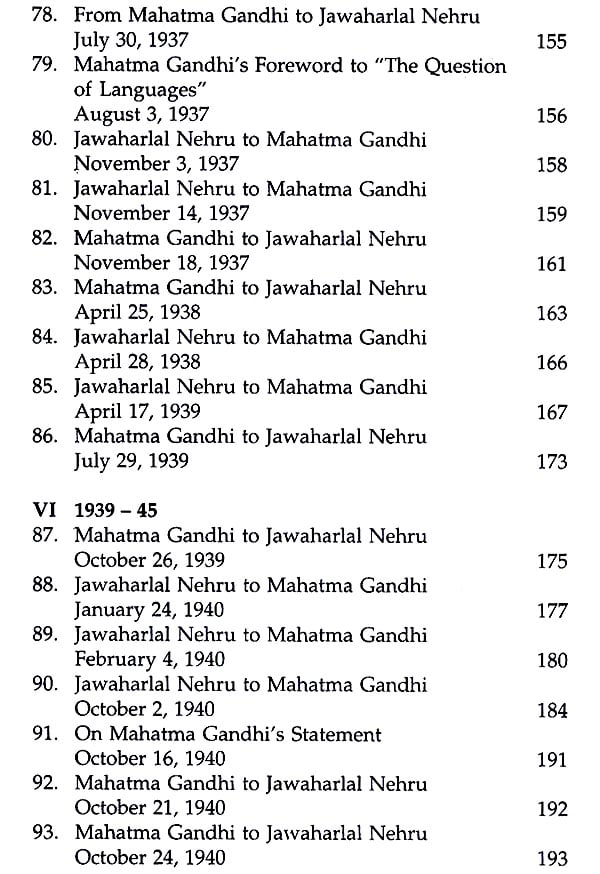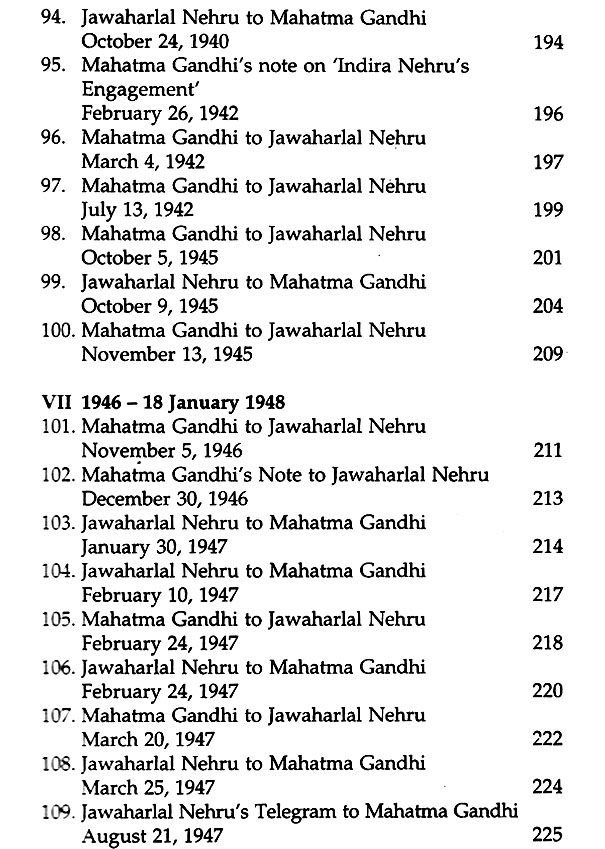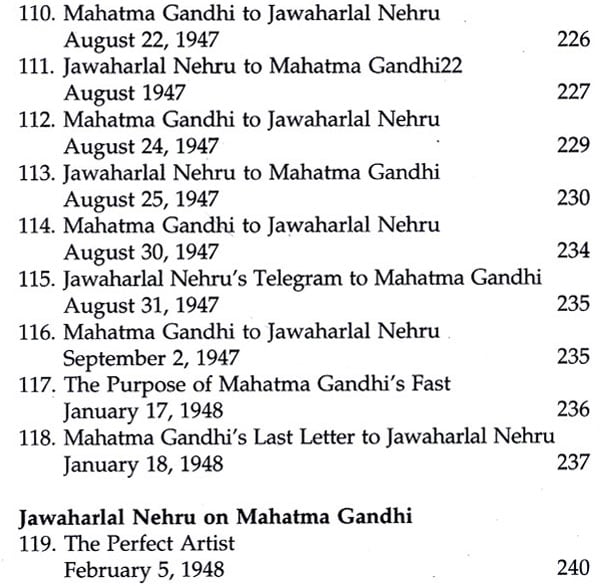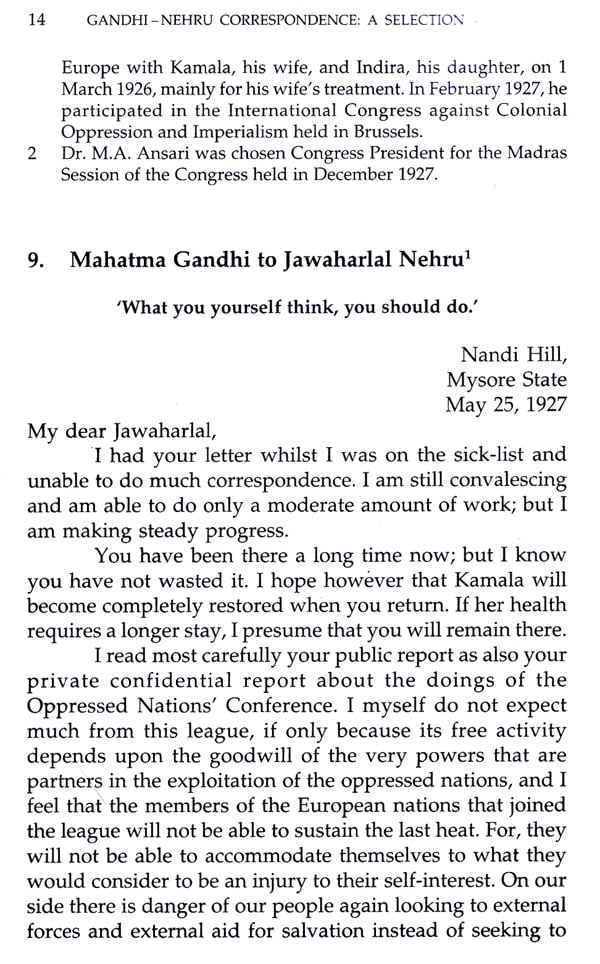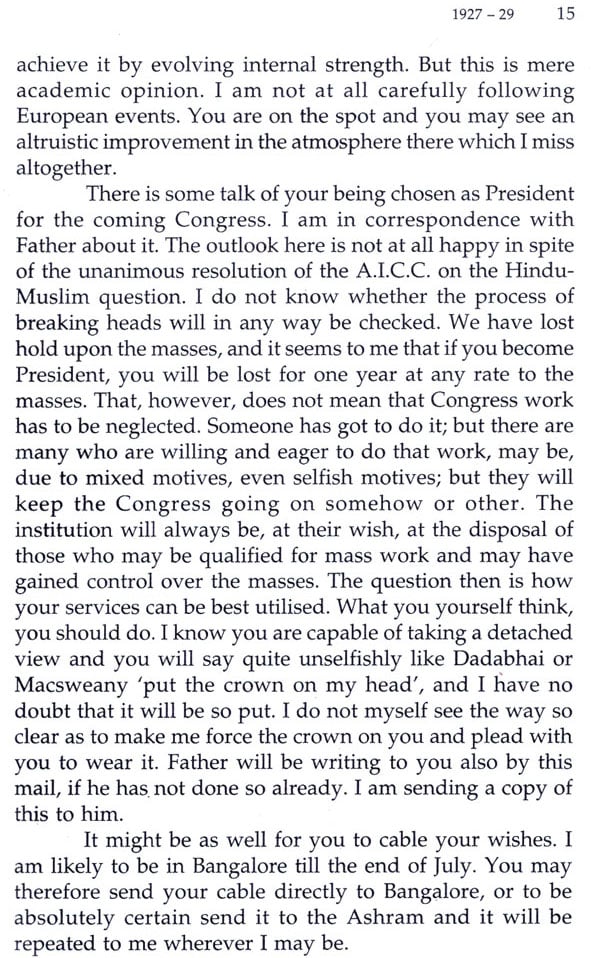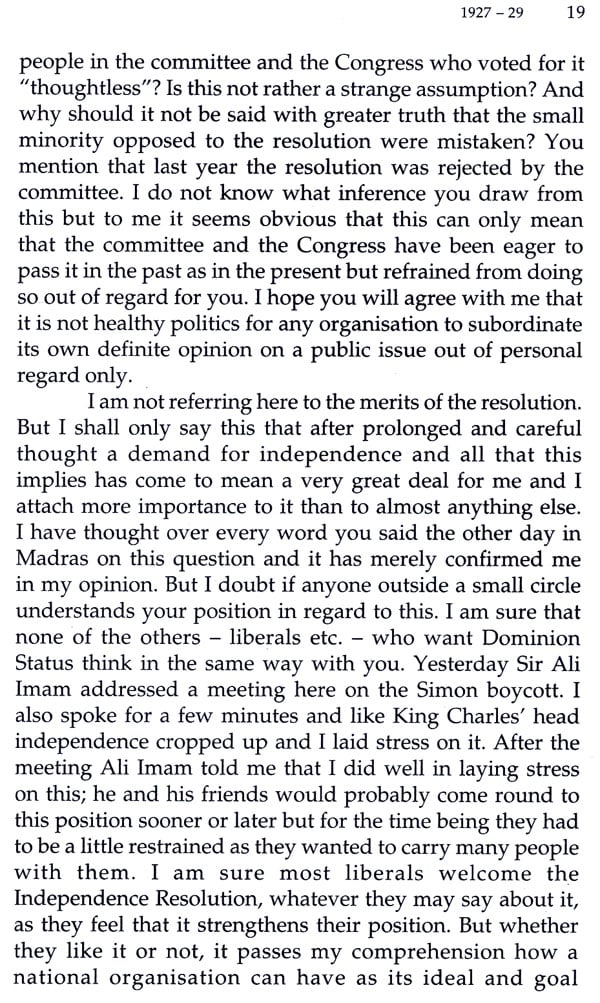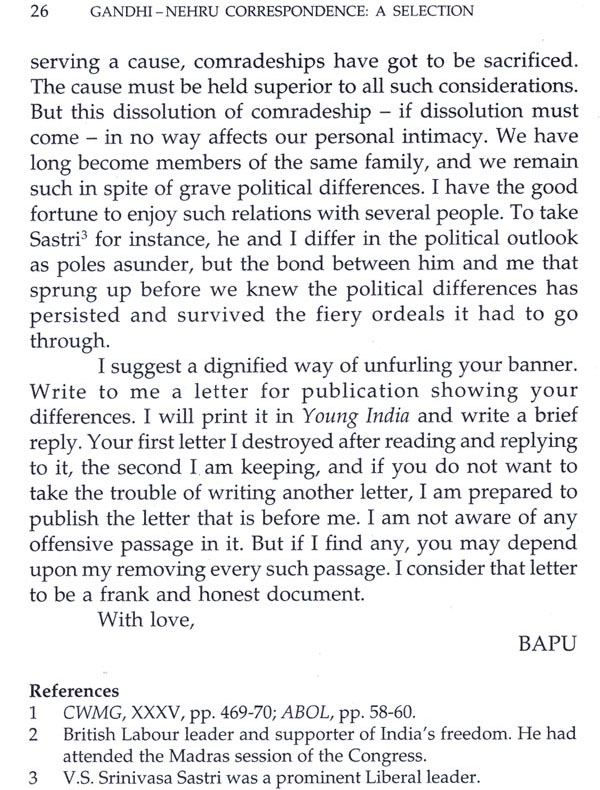
Gandhi- Nehru Correspondence ( A Selection)
Book Specification
| Item Code: | NAU016 |
| Author: | Arjun Dev |
| Publisher: | National Book Trust, India |
| Language: | ENGLISH |
| Edition: | 2018 |
| ISBN: | 9788123761251 |
| Pages: | 276 |
| Cover: | PAPERBACK |
| Other Details | 8.50 X 5.50 inch |
| Weight | 350 gm |
Book Description
Spanning a period of about 26 years, this collection brings together select correspondence between Mahatma Gandhi and Pandit Jawaharlal Nehru. Together they portray a strikingly unique relationship that was not only personal but also political. Notwithstanding the ideological differences, these exchanges bring out a comradeship that while engaging with the larger issues of the day has an important bearing on the understanding of our struggle for freedom and a vision of independent India.
Arjun Dev was former Professor of History and Head of NCERT's erstwhile Department of Education in Social Sciences and Humanities. He coordinated the work of curriculum development and preparation of educational materials in social sciences, particularly history, and was the author/co-author of various books including Modern India, The Story of Civilization, Contemporary World History and India's Struggle for Independence: Visuals and Documents. He was Member Secretary of the National Steering Committee on Textbook Evaluation and of National Advisory Committee on Contemporary India set up by the Government of India in early 1990s. A selection of Jawaharlal Nehru's writings compiled by him has been published by the Trust under the title Years of Struggle. Actively associated with human rights education, and the campaign against communalization of education, particularly in the area of history textbooks, Arjun Dev is presently the coordinator of the Towards Freedom Project of the Indian Council of Historical Research.
Jawaharlal Nehru met Gandhiji for the first time in 1916 during the Lucknow session of the Indian National Congress and within the next three or four years a unique, and in many ways a complex, relationship developed between them. The relationship was not only deeply personal—Gandhiji became virtually a senior member of Jawaharlal Nehru's family—but also political, one of close comradeship ha the struggle for India's liberation. Nehru was not a .1 a • in the sense in which many other senior leaders Abe Congress were. The two differed in their outlook on and in their ideology and on some questions there was meeting ground between them but despite all the , which sometimes seemed quite bitter, Nehru's to Gandhiji and the latter's love and affection for former never diminished. In the public eye—to the of the people all over India—the two were linked. From the late 1920s onwards, in public and processions and demonstrations in almost part of British India and in Princely States, the most slogans that were raised were: Bharat Mata ki Jai, Mahatma Gandhi ki Jai, (Pandit) Jawaharlal Nehru ki Jai besides, generally , Inquilab Zindabad. No other leader acquired the popular stature which Jawaharlal Nehru acquired, rally to Gandhiji who declared him to be his heir. closeness of the relationship between Gandhiji and Nehru, and of what each thought of the other ideological differences between them, was common knowledge to their contemporaries and, in a broad sense, to the subsequent generations. Nehru in his numerous writings dealt with what Gandhiji meant to India and personally to him. He wrote in The Discovery of India:
"And then Gandhi came. He was like a powerful current of fresh air that made us stretch ourselves and take deep breaths; like a beam of light that pierced the darkness and removed the scales from our eyes; like a whirlwind that upset many things, but most of all the working of people's minds. He did not descend from the top; he seemed to emerge from the millions of India, speaking their language and incessantly drawing attention to them and their appalling condition. Get off the backs of these peasants and workers, he told us, all of you who live by their exploitation; get rid of the system that produces this poverty and misery. Political freedom took new shape then and acquired a new content. Much that he said we only partially accepted or sometimes did not accept at all. But all this was secondary. The essence of his teaching was fearlessness and truth, and action allied to these, always keeping the welfare of the masses in view."
He also wrote about his differences with Gandhiji on various ideological questions as well as on issues relating to policies and programmes advocated by Gandhiji and decisions taken by him on crucial moments during various movements and struggles. However, the extensive correspondence between them over a period of about 25 years which is crucial to an understanding of the unique relationship that developed between them, a relationship that has few parallels, as well as of many larger issues that have a bearing on an understanding of the struggle for freedom and the vision of independent India that evolved during that struggle was not easily accessible until the publication of the Collected Works of Mahatma Gandhi and the volumes of the Selected Writings of Jawaharlal Nehru. The publication of A Bunch of Old Letters, selected by Jawaharlal Nehru, 'Written Mostly to Jawaharlal Nehru and Some Written by Him', in 1958 (and reprinted after about 30 years in 1988) made accessible for the first time to the general reader extremely important materials for a fuller understanding of the freedom struggle and, to some extent, of Jawaharlal Nehru. The largest number of the letters included in this publication were a selection of Gandhiji's letters , about 85, written to Jawaharlal Nehru over a period of about 26 years. The first of these was written in 1922 and the last one 12 days before he was assassinated. Only a few of Nehru's letters to Gandhiji were included in this volume. (Nehru initially intended to publish only Gandhiji's letters to him.) With the publication of the Collected Works of Mahatma Gandhi and the Selected Writings of Jawaharlal Nehru , many more letters of both Gandhiji and Jawaharlal Nehru written to each other became available. The selection presented in this volume is drawn entirely from these publications.
The selection is divided into seven sections, each of whet covers a specific period. The division is somewhat arbitrary except that in some ways it reflects a particular lime of the freedom struggle. Each letter carries a few words or a sentence or two taken from the text of the letter as a of caption but it does not necessarily represent the of the letter; it is only indicative of a part of the of the letter which, as most letters, unlike articles, sot deal with only one specific issue or theme. Some of Jawaharlal Nehru, however, carry his note which the context in which the letters were written. Most both Gandhiji's and, somewhat less, Jawaharlal s, refer to members of the latter's family. As stated Gandhiji himself had become a senior member of s family. In his letters, he refers, for example, to Nehru, as Father. Some letters deal almost y with family matters, such as marriages of Nehru's sister Krishna and daughter Indira, and almost every letter refers to Kamala, Jawaharlal Nehru's wife, until she passed away. The close personal nature of the relationship between Gandhiji and Jawaharlal Nehru is also reflected in the way they addressed each other changed over time. Gandhiji's first letter, for example, is addressed to 'My dear Jawaharlal' and this form remained more or less unchanged throughout except that from 1942, it became generally 'CHI Jawaharlal'. Gandhiji's first letter ended with 'Yours sincerely, M.K. Gandhi' but later it became 'Yours truly, BAPU' or just 'Yours, BAPU' and finally to 'Blessings from BAPU'. Nehru's letters began with 'Respected Bapuji' and ended with 'Yours obediently' but soon changed to 'My dear Bapu' or just 'Dear Bapu' and generally ended with 'Yours affly'.
**Contents and Sample Pages**

